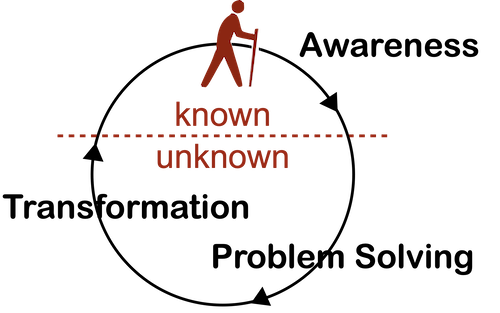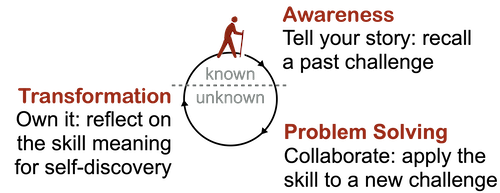Background
Resilience encourages using positive-coping skills to manage stress in an optimal way. Our objectives are to develop social support systems, positive-coping skills for resilience, self-esteem, self-efficacy (believing you are capable of reaching a goal), and problem solving skills. An entirely educational approach is used for learning resilience using the theme of the "Hero's Journey."  Common to many epic stories is the hero who, facing a challenge, goes on an adventure, is victorious, and returns as a transformed person. You are the hero in this journey.
Common to many epic stories is the hero who, facing a challenge, goes on an adventure, is victorious, and returns as a transformed person. You are the hero in this journey.
Read the following Why/How/Example Flashcard. Work on answering the questions in the Tell your story, Collaborate, and Own It exercises. Writing your responses will help you to better organize your thinking. You are most strongly encouraged to do the Collaborate exercise with another person so that you become aware of how to work with people within a social support system, people who can work with you on real life challenges. Refer to the workbook for a more in depth look at this skill and its exercises.
Belief Flashcard
Belief affects attitude. Changing your belief changes your attitude.
- Why: Your beliefs control your actions and the way you feel about something, your atitude. You can alter a belief to change your perception and better deal with a challenge. Beliefs, whether positive or negative, can affect your physical and psychological health.
- How: Approach your challenge with a realistic view. Can you change the challenge to make it more workable? If the challenge appears not changeable, then a change of attitude is possible by changing a belief.
- Consider your challenge. Is the outcome changeable? If so, then what is a more positive yet realistic outcome?
- If the outcome is not changeable, then what is your concern or fear. There is a belief that is supporting that attitude. What is a more positive belief? What are the steps needed to bring about the change to a more positive belief?
- Sometimes a challenge may require a change of belief before a more positive outcome can be found. And, sometimes altering the challenge is necessary before finding the more positive belief.
- Example: Because of a fracture, my arm is immobilized. This condition is not going away for several weeks and I can’t change it.
- My challenge is how to deal with an immobilized arm.
- The outcome is not changeable, so I focus on a change of belief.
- My concern is that I can’t do everything I want to do.
- I see that my belief is self-defeating because the belief appears to be “all or nothing” thinking.
- I work on the more positive belief that there is still opportunity to do some of what I need and want to do.
- I see now that I can also improve my outcome with a support system and by creating attainable goals.
 Hero's Journey
Hero's Journey
Tell your story
Think about a time when you used something like Belief to successfully deal with a challenge. Answer the following questions. 1) What was your challenge? 2) Did you change the challenge to something more positive or workable? 3) Did you change your Belief to something more positive?
-
Collaborate
Work with a companion and consider a real challenge you, your companion or someone you know is currently facing by applying the Belief skill. Answer the following questions. 1) What is the challenge? 2) What abilities or qualities does your companion have that can help with the challenge? 3) Can the challenge be changed to something more positive or workable? 4) Can the Belief be changed to something more positive?
-
Own it
Reflect upon the Belief skill and describe the skill in a few of your own words. You are adapting the meaning of the skill to be more useable and memorable.
 Common to many epic stories is the hero who, facing a challenge, goes on an adventure, is victorious, and returns as a transformed person. You are the hero in this journey.
Common to many epic stories is the hero who, facing a challenge, goes on an adventure, is victorious, and returns as a transformed person. You are the hero in this journey. Hero's Journey
Hero's Journey